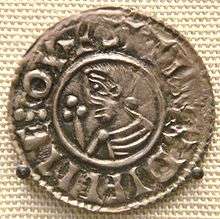Glúniarann
| Glúniarann | |
|---|---|
| King of Dublin | |
| Predecessor | Sitriuc mac Ímair or Sichfrith Jarl |
| Successor | Ímar ua Ímair |
| Issue | Gluntradhna |
| Dynasty | Uí Ímair (possibly) |
Glúniarann (Old Norse: Járnkné; literally Iron-Knee)[1] was a Viking leader who may have reigned as King of Dublin. It is speculated he may have been a member of the Uí Ímair.
Biography
The Annals of Ulster mention Glúniarann for the first and only time in 895, describing him plundering Armagh with an army of Dubliners:[2]
| “ | Ard Macha [Armagh] was plundered by the foreigners of Áth Cliath i.e. by Glún Iarainn, and they took away seven hundred and ten persons into captivity.[3] | ” |
The Annals of the Four Masters are the only other annals which mention Glúniarann by name, describing the same event:[2]
| “ | Ard Macha was plundered by Gluniarainn, and the foreigners of Ath Cliath; and they carried off seven hundred and ten persons into captivity, after having destroyed a part of the church, and broken the oratory; of which was said: Pity, O Saint Patrick, |
” |
Downham speculates that Glúniarann may have succeeded Sitriuc mac Ímair as King of Dublin.[5] Throughout the 880s and 890s Dublin suffered through debilitating dynastic conflicts, resulting in the ambiguity as to who ruled. The annals do not mention Glúniarann's origins, but the name was later used by a member of the Uí Ímair, perhaps indicating a familial connection between Glúniarann and Ímar.[5] Glúniarann's ultimate fate is unknown, but a man named Glúntradna mac Glúniarainn, likely a son, is mentioned by the annals.[6] The Annals of the Four Masters describe Glúntradna 's death:
| “ | A slaughter was made of the foreigners by the Conailli, and by Athdeidh, son of Laighne, in which were slain Amhlaeibh, grandson of Imhar, and Gluntradhna, son of Gluniarainn, with eight hundred along with them.[7] | ” |
The Chronicon Scotorum describes the same event, but adds no further information.[8]
References
Citations
- ↑ Holman, p. 41
- 1 2 Downham, p. 252
- ↑ Annals of Ulster, s.a. 895
- ↑ Annals of the Four Masters, s.a. 895
- 1 2 Downham, p. 26
- ↑ Downham, pp. 26, 252
- ↑ Annals of the Four Masters, s.a. 896
- ↑ Chronicon Scotorum, s.a. 896; Downham, p. 252
Primary Sources
- "Annals of the Four Masters". Corpus of Electronic Texts (16 December 2012 ed.). University College Cork. 2012. Retrieved 7 January 2015.
- "The Annals of Ulster". Corpus of Electronic Texts (15 August 2012 ed.). University College Cork. 2012. Retrieved 23 November 2014.
Secondary Sources
- Downham, Clare (2007). Viking Kings of Britain and Ireland: The Dynasty of Ívarr to A.D. 1014. Edinburgh: Dunedin Academic Press. ISBN 978-1-903765-89-0.
- Holman, Katherine (26 April 2012). The Northern Conquest: Vikings in Britain and Ireland. Andrews UK Limited. ISBN 978-1-908493-53-8.
External links
- CELT: Corpus of Electronic Texts at University College Cork. The Corpus of Electronic Texts includes the Annals of Ulster and the Four Masters, the Chronicon Scotorum and the Book of Leinster as well as Genealogies, and various Saints' Lives. Most are translated into English, or translations are in progress.
